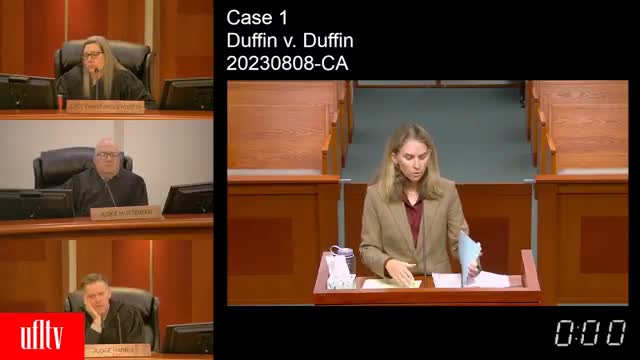Debate Over Custody Includes Key Schooling Decisions for Divorced Parents
July 26, 2025 | Utah Appellate Court Collection, Utah Family Law District Court Collection, Utah District Courts, Utah Judicial Branch, Utah
This article was created by AI summarizing key points discussed. AI makes mistakes, so for full details and context, please refer to the video of the full meeting. Please report any errors so we can fix them. Report an error »

In a recent government meeting, discussions surrounding the custody case of Duffin v. Duffin highlighted the complexities of educational decisions in divorce situations. A key point raised was the significant impact that choices about children's schooling can have on custody arrangements, emphasizing that these decisions are not merely personal preferences but carry legal implications.
One participant illustrated this by presenting a hypothetical scenario involving divorced parents with differing views on their children's education. For instance, if one parent wished to enroll the children in public school while the other, adhering to Amish beliefs, opposed this, the situation could escalate to a legal custody issue. This example underscores the importance of recognizing educational decisions as critical components of custody agreements.
The conversation also touched on whether decisions about homeschooling versus public schooling should be classified as legal custody matters. The consensus leaned towards acknowledging these choices as significant legal considerations, further complicating custody discussions.
This dialogue reflects broader concerns within the community about how divorce and custody arrangements can affect children's educational opportunities. As these discussions continue, they highlight the need for clear guidelines that address the intersection of family law and educational rights, ensuring that children's best interests remain at the forefront of custody decisions.
One participant illustrated this by presenting a hypothetical scenario involving divorced parents with differing views on their children's education. For instance, if one parent wished to enroll the children in public school while the other, adhering to Amish beliefs, opposed this, the situation could escalate to a legal custody issue. This example underscores the importance of recognizing educational decisions as critical components of custody agreements.
The conversation also touched on whether decisions about homeschooling versus public schooling should be classified as legal custody matters. The consensus leaned towards acknowledging these choices as significant legal considerations, further complicating custody discussions.
This dialogue reflects broader concerns within the community about how divorce and custody arrangements can affect children's educational opportunities. As these discussions continue, they highlight the need for clear guidelines that address the intersection of family law and educational rights, ensuring that children's best interests remain at the forefront of custody decisions.
View full meeting
This article is based on a recent meeting—watch the full video and explore the complete transcript for deeper insights into the discussion.
View full meeting

